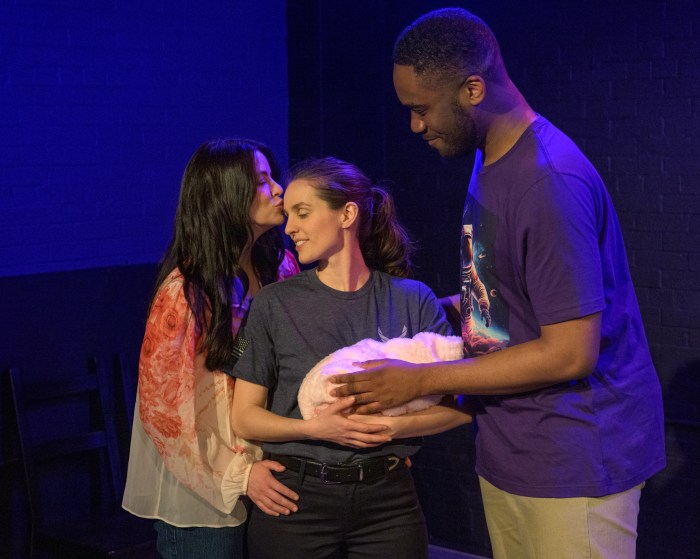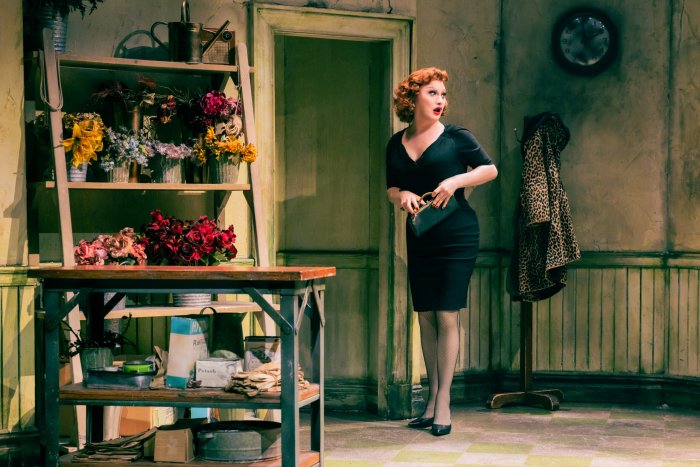Lorenzo Pisoni, Lee Pace, Will Rogers, and Bebe Neuwirth in Terrence McNally’s “Golden Age.” | JOAN MARCUS
Opera features prominently in the work of Terrence McNally, and while it’s often used for bravura effect (notably in “The Lisbon Traviata” and “Master Class”), his new play “Golden Age” is, for all the surface histrionics of the deliciously over-the-top characters, a delicate play about loss, love, and forgiveness that is consistently engaging, thought-provoking, and ultimately moving.
It is 1835, the opening night of Vincenzo Bellini’s final opera, “I Puritani,” and we find ourselves backstage at the Théâtre-Italien in Paris. Bellini has brought four of his favorite singers to perform at the premiere, and as the show begins, they are in a flurry of ego, anxiety, and dishing about — among other things — their careers, their talents, and Bellini’s rival composer Donizetti. But there is plenty of drama to go around.
The baritone Antonio Tamburini is padding his pants with vegetables to increase his sex appeal. Luigi LaBlanche, the bass, bemoans the fate of all basses, while Giulia Grisi, the soprano, frets about her performance — and her bitter rivalry with another Bellini favored soprano, Maria Malibran, who just happens to show up backstage. Meanwhile Bellini is increasingly ill and his attentive lover, Francesco Florimo, looks on, while the tenor Giovanni Rubini pines for Grisi, who in turn is smitten with Rubini’s rival. Rubini vows to win Grisi by singing the F above High C, something no tenor has yet achieved. (It is also a turning point in “I Puritani,” but you don’t need to know that to appreciate Rubini’s torment, or any of the play for that matter.) All together, the story is enough to make one’s head spin, and if this were a kind of opera world “Noises Off,” that might even be enough.
However, don’t let the theatrics fool you. The center of this play is ultimately an intimate look at how we each must confront that point of no return when we become fully cognizant of our limitations and our mortality. It could be the end of a career as with Malibran, the demise of a dream of love for Rubini, or death in the case of Bellini, but it comes to us all, and if we survive, for a while at least, we are irretrievably changed by it. It is the dichotomy between the life we manufacture for public consumption and the darker places within our private selves.
In talking about the creation of the opera, Bellini says near the end of the play, “No one will know what it cost me.” If we are conscious, each of us knows what creating our lives has cost, and we alone can judge if it was worth the price.
Walter Bobbie’s powerful direction brings the world to life and balances McNally’s sharp, contemporary language with a sense of period, ably assisted by the wonderful costumes of Jane Greenwood and Santo Loquasto’s set.
The cast, too, is outstanding. Lorenzo Pisoni as Tamburini is both swaggering and insecure. Ethan Phillips as LaBlanche is a stabilizing influence, an older man who has made his peace. Eddie Kaye Thomas as Rubini and Dierdre Friel as Grisi are both perfectly self-centered and youthful. Lee Pace is excellent as Bellini, and Will Rogers as Florimo is a passionate outsider to this world in a touching and moving portrayal of love in the face of artistic temperament.
Bebe Neuwirth gives an extraordinary and underplayed portrayal of Malibran, a woman who knows her career is nearing its end and yet is not quite ready to yield the spotlight. The subtle tension in her portrayal between the proud diva and the apprehensive woman is a highlight of the evening.
McNally has brilliantly upended the backstage story to ask the bittersweet question whether the “Golden Age” is before or after we understand the transitory nature of, well, everything.
” src=”http://gaycitynews.com/wp-content/uploads/2013/01/BYRNE-annie-THEATER.jpg” width=”300″ height=”199″ />


































